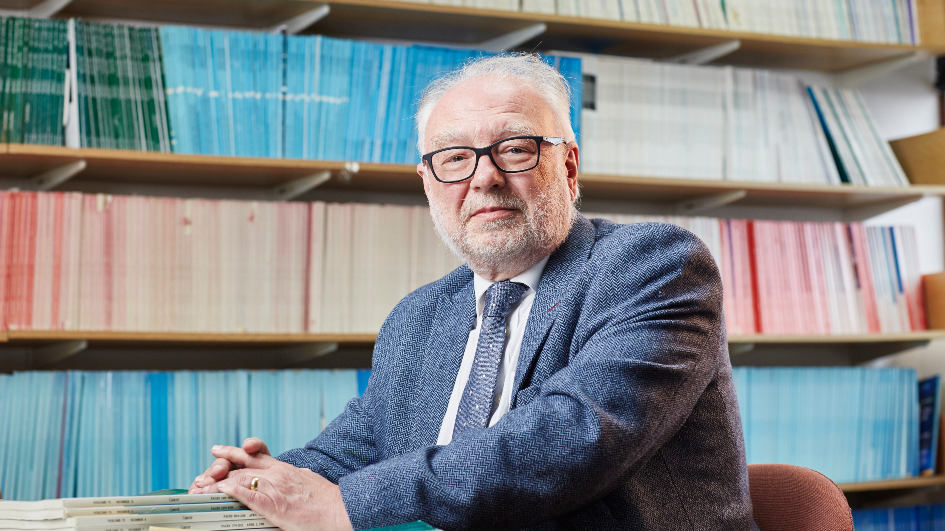
After completing posts as a junior doctor, Professor Dearnaley joined the ICR and Royal Marsden for a training position in radiotherapy and oncology, completing a research degree on novel detection methods for breast cancer bone micrometastases – small groups of cancer cells that have spread from the original tumour to bone – beginning a career that would make waves in his field.
Changing the status quo
Throughout his career, his research has made seminal contributions, most notably to the way prostate cancer is treated with radiotherapy. His colleagues describe him fondly as someone willing to challenge the status quo for the good of patients, passionate about developing curative treatments with fewer side effects, and improving outcomes and quality of life for patients.
During his tenure at the ICR, Professor Dearnaley was responsible for leading world-class clinical trials and studies into radiotherapy, including the development of conformal radiotherapy (CFRT), intensity-modulated radiotherapy (IMRT), image-guided (IGRT) and hypofractionated radiotherapy.
He was also involved in early phase and subsequent phase III trials of abiraterone and biphosphonate drugs which target bone metastases – treatments for prostate cancer whose effects will continue to change lives for decades to come.
Key radiotherapy trials under his leadership, such as the Cancer Research UK-funded CHHiP trial and the Medical Research Council-funded RT01 trial, have resulted in major changes to treatment guidelines globally, with patients receiving radiotherapy regimens that have a greater impact on their cancers while shielding healthy tissue from damage.
Not only have colleagues and students lauded Professor Dearnaley’s ground-breaking research in tributes to him upon his retirement – they have also spoken to his generosity, kindness and mentorship. Last year, a symposium held in his honour attracted participants from around the world, many of whom had been trained by Professor Dearnaley and were delighted to celebrate his work with him.
In recognition of his outstanding achievements and contributions to the field, Professor Dearnaley has been made Emeritus Professor upon his retirement, together with Professor Nandita DeSouza and Professor John Yarnold.
Special partnerships and collaborations
Speaking about his career, Professor Dearnaley said:
“I have always enjoyed setting up and contributing to collaborations and I’ve had the privilege to work with outstanding colleagues both in the ICR and Royal Marsden Hospital.
“My work with Professor Steve Webb, Professor of Radiotherapy and Imaging, developing IMRT and with Professor Emma Hall, Deputy Director of the Clinical Trials and Statistics Unit, conducting clinical trials has been particularly satisfying – but there are so many more examples.
“The foundation of my career was the very special clinical partnership I had with Professor Alan Horwich in the Academic Radiotherapy and Urology Unit and I’m delighted that the Unit continues to go from strength to strength with its wonderful new team of Consultant Oncologists and Clinician Scientists. The future is in good hands.”
Emeritus Professor
Professor Kevin Harrington, Professor of Biological Cancer Therapies and Joint Head of the Division of Radiotherapy and Imaging at the ICR, nominated Professor Dearnaley for the position of Emeritus Professor – along with two other distinguished researchers Professor Nandita DeSouza and Professor John Yarnold.
Speaking about Professors Dearnaley, DeSouza and Yarnold, Professor Kevin Harrington – who nominated the three for the position of Emeritus Professor – said:
“It has been an absolute privilege and a pleasure to work with Professor Dearnaley, Professor DeSouza and Professor Yarnold over many years.
“It's difficult to put into words just how significant their contributions to cancer research have been, leading to clinical findings that have transformed cancer care for patients with breast cancer, prostate cancer, cervical cancer and numerous other diseases.
“As colleagues, they have been shining examples to generations of clinicians and researchers, and they have always been incredibly generous with their time, ideas and intellect. We will miss them enormously as they move on from their roles at the ICR, but I can't think of a more fitting way to honour their hard work, scientific rigour and achievements throughout their careers.”